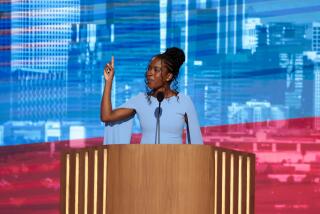Everyman Invited to Laureate’s Poetry Party
- Share via
New U.S. poet laureate Billy Collins said Thursday he plans to bring the same mischievous, sharp spin to his Library of Congress appointment that permeates his poetry of the familiar--the poignancy of turning 10, the neighbors’ barking dog, the idle musings of someone chopping parsley and listening to “Three Blind Mice.”
“I think of poetry as something both serious and an occasion for playfulness,” said Collins, 60, in an interview. “I suppose I might differ from previous poet laureates by kind of emphasizing the playful or even screwball aspects of poetry....I think of humor not as a way of entertaining readers but as a way of accessing more serious areas--a doorway into a whole set of other dimensions.”
Librarian of Congress James H. Billington named Collins the Library’s 11th poet laureate on Thursday. Collins, distinguished professor of English at Lehman College, City University of New York, takes over the post in the fall, opening the library’s annual literary series in October with a reading of his work. He succeeds Stanley Kunitz. Other poets who have held the post, which previously was known as the library’s consultant in poetry, include Robert Frost, Robert Penn Warren and Elizabeth Bishop. The poet laureate, who receives a $35,000 stipend, is appointed annually.
The appointment, Collins said, caught him so off guard that he hasn’t had time to think about specific projects. “I think you’re supposed to say that you were doing something like making a peanut butter and jelly sandwich, but I was actually working on a poem when I got the call.”
Collins, who received his PhD from UC Riverside, is one of the rare poets with popular and professional standing. He has a six-figure contract with Random House, his last three collections of poems (“The Art of Drowning,” “Picnic, Lightning” and “Questions About Angels”) have sold more than 50,000 copies total, breaking sales records for poetry, and he has read his work regularly on National Public Radio. He has received fellowships from the New York Foundation for the Arts, the National Endowment for the Arts and the Guggenheim Foundation.
“I’m absolutely delighted,” poet Carol Muske-Dukes, a USC creative writing professor, said of Collins’ appointment. “I think he does what great poets do--bring a sense of urgency and humor and profundity to poetry and make it available to people in their own lives. Also, noted Muske-Dukes, who has participated in writers’ conferences with him, Collins is an academic and “an astonishing teacher.” The poet laureate has few official duties other than giving an annual reading and lecture. In recent years, poets who held the position have worked on ways of broadening the appeal of poetry. Joseph Brodsky’s idea was to provide poetry in places such as airports, supermarkets and hotel rooms. Rita Dove invited writers to explore the African diaspora. Robert Pinsky’s Favorite Poem Project took on a life of its own, with Americans including President Clinton making contributions.
“It’s a great honor, of course,” Collins said. “I have a distinguished line of predecessors. I think each poet laureate brings something different. I hope to put my own stamp on it. I’m not sure what that stamp looks like.”
Off the top of his head, he said, he would like to encourage all 50 states to appoint a poet laureate.
Meanwhile, he will continue to do what he has always done. He still talks about writing poems like he’s an undergraduate, trying to get it right; now, he just has a bigger platform. “I think poetry comes out of an intensely private zone,” he said. “You dabble around with language and stay up late pushing little words around like a crazy man doing a crossword puzzle and suddenly there’s a national spotlight on you.”
He will keep writing about the familiar, anything to get people to read poems. Say the neighbors’ barking dog, which he tries to drown out by putting on a Beethoven symphony full blast, “but I can still hear him muffled under the music,/ barking, barking, barking,/ and now I can see him sitting in the orchestra/his head raised confidently as if Beethoven/had included a part for barking dog.”
And Collins keeps inviting people to his party. In his poem, “Dear Reader,” he writes: “Baudelaire considers you his brother,/and Fielding calls out to you every few paragraphs/as if to make sure you have not closed the book,/and now I am summoning you up again,/attentive ghost, dark silent figure standing/in the doorway of these words.”
More to Read
Sign up for our Book Club newsletter
Get the latest news, events and more from the Los Angeles Times Book Club, and help us get L.A. reading and talking.
You may occasionally receive promotional content from the Los Angeles Times.






